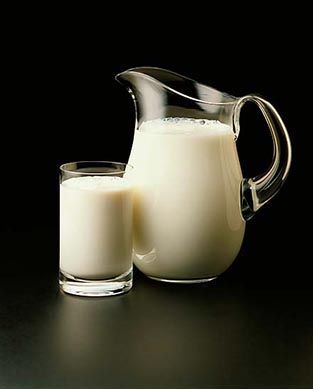Milk is one of the best sources of protein and calcium in the human diet. It is an ideal food for improving nutrition, enhancing physical fitness and delaying aging. Its rich nutritional value has been universally recognized. For physically fit expectant mothers, a glass of milk should be guaranteed every day to ensure and promote the development of the fetus. The benefits of drinking a glass of milk every day: 1 Tyrosine in milk promotes a massive increase in happy hormones. 2 Iron, copper, and vitamin A in milk have a cosmetic effect that makes the skin smooth and delicate. 3 Vitamin A in milk improves vision. 4 Calcium in milk increases bone growth. 5 Yogurt and skim milk enhance immune system function. How to use milk to add health points: 1 When choosing milk, you should use a brand with a reputation, and pay attention to the nutritional content, production date, shelf life, and storage conditions of milk. 2 Drink in the morning and avoid an empty stomach. It's best to eat some food first, such as bread, biscuits, etc., and then drink milk. 3 Drink at night and calm down to help sleep. Drinking milk at night can be 2 hours after a meal or 1 hour before bedtime. Drinking methods (hot or cold) depend on personal habits and the ability of the gastrointestinal tract to adapt to cold milk. How much milk do mothers drink each day? It is generally recommended that after the second trimester, drink 300 to 500 ml of milk (approximately 1 to 2 bags) each day to supplement calcium and protein. At the same time, you can also add some other nutrients, such as vitamins, minerals and so on. Which mothers should not drink milk Mothers with the following illnesses should be cautious when choosing whether to drink milk: Patients with iron deficiency anemia: The iron in food needs to be converted into ferrous iron in the digestive tract to be absorbed and utilized. If pregnant mothers with iron deficiency anemia drink milk, the ferrous iron in the body will combine with the calcium salt and phosphorus salt in the milk to form insoluble compounds. It will affect the absorption and utilization of iron, which is not conducive to the recovery of health of expectant mothers. Patients with lactobacid acid deficiency: Milk has a high lactose content, but it must be broken down into galactose and glucose in the digestive tract lactobionic acid before it can be absorbed by the body. If lactobionic acid is lacking, eating milk can cause abdominal pain and diarrhea. Patients with digestive tract ulcers: Although milk can relieve gastric acid irritation to the ulcer, it can stimulate the gastrointestinal mucosa to secrete a large amount of gastric acid, which will exacerbate the condition. Zhoushan City Shuangying Aquatic Products Co., Ltd.  , https://www.shuangying-aquatic.com